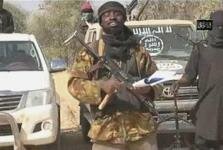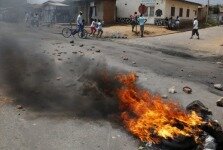Photograph: Peter de Jong / Pool /EPA
The International Criminal Court’s chief prosecutor dropped all charges of crimes against humanity against Kenya’s president on Friday, highlighting the court’s difficulties in bringing to justice the high-ranking officials it has accused of atrocities.
A spokeswoman for the prosecution office, Florence Olara, said that a prosecutor, Fatou Bensouda, had filed a notice withdrawing the charges against President Uhuru Kenyatta.
Kenyatta had been charged with murder, rape, persecution, deportation and other inhumane acts as an “indirect co-perpetrator” in violence that flared after Kenya’s 2007 elections leaving more than 1,000 people dead.
The collapse of the case is a new blow to the credibility of the court’s prosecution office. The office has begun nine full investigations since its establishment in 2002, all of them in Africa, and has just seven suspects in custody.
Reacting to the news on Friday, Kenyatta said he was “excited” and called for a case against his deputy, William Ruto, and another to be dropped as well. “One down, two to go,” he said.
Kenyatta’s British lawyer, Steven Kay, said that the court and its prosecutors “owe [Kenyatta] an apology for bringing proceedings based upon false witnesses and impugning his integrity”.
Kenyatta’s trial was has postponed twice this year while prosecutors attempted to shore up their case after a key prosecution witness refused to testify and another admitted giving false evidence. Earlier this week, judges gave prosecutors a week to say whether their case remained strong enough to continue or to drop the charges.
Kenyatta was indicted in 2011 but went on to become the president of Kenya in the 2013 election, using his indictment at the Hague-based court as an election issue. His government lobbied hard to have the case against him deferred by the UN security council, arguing that the delay was essential because Kenya needed its leader to help fight al-Shabaab terrorists in neighbouring Somalia and at home.
The collapse of the case against Kenyatta underscores some of the limitations of the international court, which has no police force and must rely on help from governments that may only wish to cooperate when it suits their political purposes.
The court’s mission is to prosecute perpetrators of atrocities when a country is unwilling or unable to prosecute them itself.




